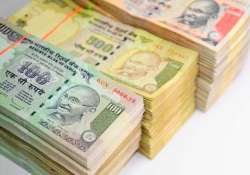Rupee fall has forex reserves plunging $16.5 bn since April 2013
New Delhi: RBI's fight to prop the tottering rupee has contributed substantially to forex reserves dipping by a hefty 416.554 billion or 6 per cent to a low of 4275.49 billion since the beginning of

New Delhi: RBI's fight to prop the tottering rupee has contributed substantially to forex reserves dipping by a hefty 416.554 billion or 6 per cent to a low of 4275.49 billion since the beginning of this fiscal.
According to marketmen, a large part of this has been used to save the bleeding rupee, which went on a downward spiral after May 22 when Ben Bernanke of the US Fed had hinted at turning his easy money policy much earlier than previously hinted.
According to the latest Reserve Bank data, forex reserves plunged to 4275.491 billion to the week ending August 30, which is a near 6 per cent fall from 4292.646 billion as of March 29.
The Indian rupee opened the fiscal at 54.25 to the US dollar but fell to a life-time low of 68.86 on August 28, losing nearly a third of its value. However, since the new RBI Governor Raghuram Govind Rajan took over the affairs of the Mint Street on September 4, the rupee has been on a winning streak, and closed the last trade on Friday at 65.24 to the dollar.
On a weekly basis, the reserves dropped by 42.2 billion as of August 30, marking a three-year low, the RBI data showed.
Overall, the foreign currency assets have fallen more to the tune of 43.08 billion to 4247.40 billion in the week ended August 30.
The Reserve Bank was net seller of the dollar twice this year in May and June, according to its monthly data.
In June this year, RBI sold 42.252 billion net of the US currency, while in May it sold 4107 million dollars.
Looking at the steep fall in the overall numbers, marketmen said, it could be surmised that the central bank has intervened in a much more heavier and frequent manner in the forex market in July and August, as these two months saw the rupee plunging to new lows.
According to forex dealers, RBI not only intervened in May and June, but was present in the market all through July and August when rupee was touching new lows.
The rupee has been in free-fall territory since May 22 when the US Federal Reserve said it would slow and finally taper of its monthly 485 billion buyback of government debt or withdraw its easy money policy called quantitative easing.
The announcement led to a massive selling by the overseas investors in the country's debt and equity markets, to the tune of nearly 415 billion, mostly from the debt market.
To save the rupee, the central bank had announced various liquidity tightening measures starting July 15, including steeply hiking call money rates and partly bringing back capital control.
According to marketmen, a large part of this has been used to save the bleeding rupee, which went on a downward spiral after May 22 when Ben Bernanke of the US Fed had hinted at turning his easy money policy much earlier than previously hinted.
According to the latest Reserve Bank data, forex reserves plunged to 4275.491 billion to the week ending August 30, which is a near 6 per cent fall from 4292.646 billion as of March 29.
The Indian rupee opened the fiscal at 54.25 to the US dollar but fell to a life-time low of 68.86 on August 28, losing nearly a third of its value. However, since the new RBI Governor Raghuram Govind Rajan took over the affairs of the Mint Street on September 4, the rupee has been on a winning streak, and closed the last trade on Friday at 65.24 to the dollar.
On a weekly basis, the reserves dropped by 42.2 billion as of August 30, marking a three-year low, the RBI data showed.
Overall, the foreign currency assets have fallen more to the tune of 43.08 billion to 4247.40 billion in the week ended August 30.
The Reserve Bank was net seller of the dollar twice this year in May and June, according to its monthly data.
In June this year, RBI sold 42.252 billion net of the US currency, while in May it sold 4107 million dollars.
Looking at the steep fall in the overall numbers, marketmen said, it could be surmised that the central bank has intervened in a much more heavier and frequent manner in the forex market in July and August, as these two months saw the rupee plunging to new lows.
According to forex dealers, RBI not only intervened in May and June, but was present in the market all through July and August when rupee was touching new lows.
The rupee has been in free-fall territory since May 22 when the US Federal Reserve said it would slow and finally taper of its monthly 485 billion buyback of government debt or withdraw its easy money policy called quantitative easing.
The announcement led to a massive selling by the overseas investors in the country's debt and equity markets, to the tune of nearly 415 billion, mostly from the debt market.
To save the rupee, the central bank had announced various liquidity tightening measures starting July 15, including steeply hiking call money rates and partly bringing back capital control.